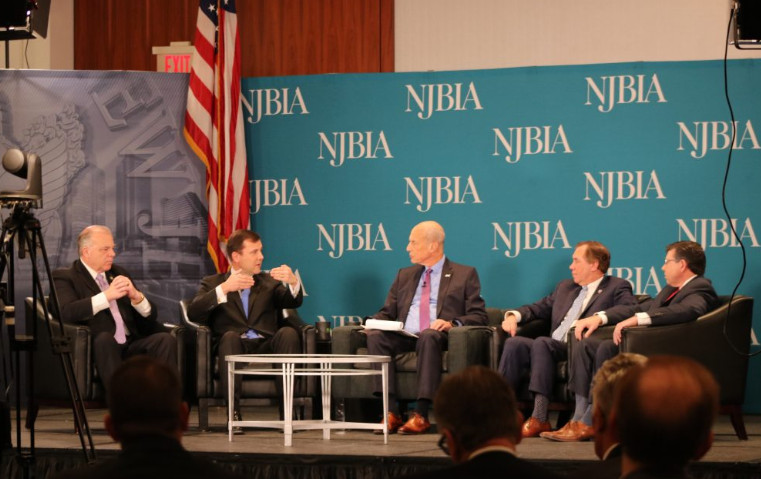STATE HOUSE, BOSTON – Now that voters have OK’ed commercial marijuana, Secretary of State William Galvin’s office told lawmakers Monday that the Legislature should make the process for cities and towns to opt out of hosting marijuana businesses easier to follow.
Michelle Tassinari, election legal counsel and director of the secretary of state’s election division, testified before the Joint Committee on Marijuana Policy to promote a bill (H 1057) Galvin filed with Rep. Angelo Scaccia that would clarify the process for cities and towns that wish to prohibit commercial marijuana establishments.
“The process, we felt, needed clarification so that it is consistent among all cities and towns as opposed to some cities and towns doing things differently,” Tassinari said. “It was about clarity and consistency.”
Describing the legislation as “a clean-up bill,” Tassinari said the bill intends to provide municipalities with a uniform way to adopt bylaws or ordinances to impose “reasonable safeguards on the operation of marijuana establishments.”
“Essentially, the first thing that we identified as something that would be a problem for cities and towns who are in the process of trying to adopt these local control procedures is that they are definitely inconsistent with state law,” she said.
Previously, the attorney general’s office and the Massachusetts Municipal Association told the Marijuana Policy Committee that the process that cities and towns must follow to opt out of the legal marijuana market has sparked concern in city and town halls.
“Many have expressed concern that the law is not clear as to whether a limit on the number of marijuana establishments or a complete ban can be accomplished by town meeting vote, bylaw vote or a town wide ballot vote, or whether both a town meeting vote and a town-wide ballot vote are required. And if a ballot vote, what should that ballot vote say?” Margaret Hurley, who runs the attorney general’s Worcester regional office and focuses on municipal law, told the committee two weeks ago.
A majority of voters approved legalizing marijuana and it became legal for adults to possess, use and gift marijuana in December. In about 25 percent of municipalities, opponents of the law prevailed and it’s unclear how voters feel about retail shops in their communities even in cities and towns that approved the question.
To prohibit marijuana commerce, as Westborough has already voted to do, a city or town must first pass a bylaw or ordinance prohibiting such activity and then put that town bylaw or ordinance before voters for approval.
But current state law has no mechanism for putting a bylaw before voters for approval on a ballot, Tassinari said. Another issue involves the process for either approving or prohibiting the sale of marijuana and marijuana products for consumption on the premises where it was sold.
The marijuana law requires municipalities to vote to opt in or to opt out of on-premises consumption, and the law requires a petition process that conforms “to the provisions of the General Laws relating to initiative petitions at the municipal level.” The problem, Tassinari said, is that there is no state law dealing with local ballot initiative processes.
Galvin’s bill, she said, would make the process for adopting a local bylaw and then putting it before voters more easily understood, and would remove a requirement that a vote on whether to allow on-premises consumption be held only in conjunction with biennial state elections.
“We have proposed language which would provide a process for the local adoption of a bylaw or an ordinance … and then again we also have proposed language for a local ballot question on a petition that we think would work to come out to the same end as what the law itself intended,” Tassinari said. “This is to create a process. We don’t want to change the intent of what the entire petition was … we’re just trying to facilitate the process and make it a consistent process.”
Legislative leaders and the governor delayed implementation of the commercial marijuana market by six months, pushing the earliest opening date for retail marijuana shops to July 2018, and the Marijuana Policy Committee has been tasked with making alterations to the ballot law.
“We did that with the best intentions in mind and that was to ensure that people are spending their assistance on necessities, to ensure taxpayer money is protected and also to protect the integrity of those programs,” O’Connell, a Taunton Republican, said. “During that time there was also fraud and misuse uncovered in those programs … right now we have the opportunity to avoid that happening in this case.”
O’Connell’s bill adds recreational marijuana to the list of already prohibited items, including alcohol, tobacco, Lottery tickets, jewelry and gambling. The bill would allow people on cash assistance to use their benefits to purchase medical marijuana if it is legally prescribed to them by a doctor.
“It does have an exception for medical marijuana because we see the issue there,” O’Connell said.
Rep. James Lyons testified in favor of either repealing the marijuana law outright or slowing the implementation process until the state gets a handle on the opioid crisis.
“There were 635 opioid-related deaths in 2006 and in 2011 the number was at 613. It spiked up in 2012 to 698 and from 2012 we have gone from 918 deaths to 1,379 deaths to 1,751 deaths to 1,979 deaths. So the question is, what changed?” Lyons said. “I suggest to you there were two things that took place … one, we decriminalized marijuana in 2008 and two, we passed a medical marijuana bill in 2012.”
“If you were to put 100 people here you would say that he was the last one that you would pick that would die of a heroin overdose,” Lyons said. “But he loved marijuana. I can tell you four different stories of kids the same age who are now in treatment or recovering heroin addicts, all who found their drug of choice in marijuana.”
credit:wickedlocal.com








